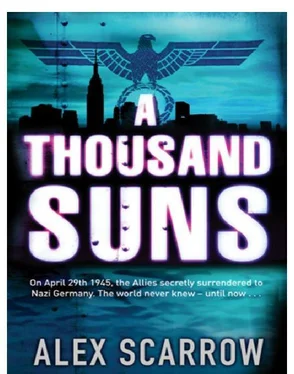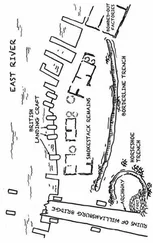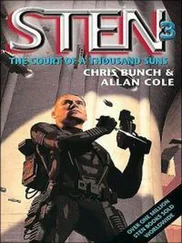Alex Scarrow - A thousand suns
Здесь есть возможность читать онлайн «Alex Scarrow - A thousand suns» весь текст электронной книги совершенно бесплатно (целиком полную версию без сокращений). В некоторых случаях можно слушать аудио, скачать через торрент в формате fb2 и присутствует краткое содержание. Жанр: Триллер, на английском языке. Описание произведения, (предисловие) а так же отзывы посетителей доступны на портале библиотеки ЛибКат.
- Название:A thousand suns
- Автор:
- Жанр:
- Год:неизвестен
- ISBN:нет данных
- Рейтинг книги:4 / 5. Голосов: 1
-
Избранное:Добавить в избранное
- Отзывы:
-
Ваша оценка:
- 80
- 1
- 2
- 3
- 4
- 5
A thousand suns: краткое содержание, описание и аннотация
Предлагаем к чтению аннотацию, описание, краткое содержание или предисловие (зависит от того, что написал сам автор книги «A thousand suns»). Если вы не нашли необходимую информацию о книге — напишите в комментариях, мы постараемся отыскать её.
A thousand suns — читать онлайн бесплатно полную книгу (весь текст) целиком
Ниже представлен текст книги, разбитый по страницам. Система сохранения места последней прочитанной страницы, позволяет с удобством читать онлайн бесплатно книгу «A thousand suns», без необходимости каждый раз заново искать на чём Вы остановились. Поставьте закладку, и сможете в любой момент перейти на страницу, на которой закончили чтение.
Интервал:
Закладка:
The rubble from the previous night’s devastation had been swept aside to allow at least one lane of traffic to pass down. But there were no other vehicles on the road tonight, just his staff car, with a driver anxious to tuck the vehicle away in the concrete vehicle bunker two streets away.
Hauser was horrified by the ruins around him. His last visit to Berlin had been six months ago. This place had been a city back then, these buildings intact, the road awash with streetlights and bustling with activity. That had been the occasion Albert Speer, the Armaments Minister, had green-lighted the project, appalled at the lack of progress and the wasted resources thrown at Heisenberg’s failed attempt. The proposal Hauser had submitted, quoted at a fraction of the cost, had promised so much more. It had been an easy decision for Speer to make.
Just six months ago.
Berlin is a dead city.
Hauser wondered why, when a place becomes nothing more than a few stacked bricks in a sea of dust, people continue to think of it as a city. Stalingrad had looked like this once, and yet those bastard, in-bred peasants had died in their thousands to keep hold of it. Perhaps the Russians were asking that question of the Germans now.
A Feldwebel of the Leibstandarte, Hitler’s personal SS bodyguard, approached him from the dark archway of the Chancellery.
‘Doctor Hauser?’
Hauser nodded. ‘Yes.’
‘Come this way please.’
Hauser looked at the gloomy entrance to the Chancellery building. In the moonlight it looked like a yawning mouth framed with decaying teeth.
‘Doctor… please, it’s dangerous to stand out here in the open.’ The soldier beckoned with a gloved hand. ‘Follow me, we can enter via the basement of the Reich Chancellery.’
‘He is really here?’ Hauser gestured at the ruined buildings around them.
‘Of course, but below ground, sir. Now please…’
A rogue shell from the Soviet bombardment landed only half a mile away with a thud that was more felt than heard.
‘All right… all right,’ said Dr Hauser anxiously.
The soldier waved the staff car on, and it began to pick its way slowly down the cleared gap in the road, headlights off.
‘The Reich Chancellery took several hits some weeks ago. It’s no longer used, but we have cleared the access way to the basement. We have power and lights below, but until we get down there,’ the soldier produced a flashlight, ‘we’ll have to use this.’
He headed swiftly towards the steps leading up between the twin columns of the main entrance. As he jogged up the steps, the bouncing flashlight made giant shadows from the columns dance across the enormous marble walls.
Inside, they passed a machine-gun post discreetly hidden within the shadows of the interior. Two more men of the Leibstandarte manned it; they nodded silently at the Feldwebel as he passed by with Dr Hauser following. They entered what was once the large marble-covered foyer. The torchlight picked out only the floor, covered in an inch of white plaster powder. As they walked swiftly across the floor of the foyer, they kicked up plumes of dust that the gusting breeze grabbed hold of and whipped up into little cyclones near the high ceiling.
‘This way, sir.’ The soldier led him towards a door that led to the mezzanine floor. He opened the door and the pair of them descended a metal staircase to a basement, which was full to the ceiling with wooden boxes.
‘What’s in these?’ Hauser asked.
The Feldwebel reluctantly engaged the question and panned his torch beam across the stacks of crates and boxes. ‘Documents, records from the Chancellery building. They moved most of the important things from the floors above us down here before it was hit.’
The soldier proceeded down the stairs, and they wound their way tightly through the floor of boxes to the entrance of the basement. The soldier pulled open the door and the faint yellow light from a wall lamp inside illuminated them. The soldier snapped off his torch.
They walked swiftly down a second flight of stairs to the basement, and along a narrow corridor, the walls painted a drab olive colour and lined with pipes and cables and yet more storage crates. The soldier pointed to the end of the corridor.
‘Down there.’
Dr Hauser saw a solid-looking iron door guarded by two more soldiers. They sat behind a small wall of sandbags and jumped to their feet at the sound of the Feldwebel and Hauser approaching.
Dr Hauser pointed towards the door. ‘Is that — ?’
‘Yes, that’s the door to the bunker.’
The Feldwebel presented himself to the guards. ‘I have Dr Karl Hauser, he’s expected for a meeting at twenty-one hundred hours.’
One of the guards picked up a phone and carefully announced the name and meeting time. He listened to the response and nodded once before replacing the phone.
‘You’re expected. Door one is Matador.’ The guard pulled back a bolt on the iron door and pushed it inwards. It swung slowly and heavily. Hauser could see it was at least a foot thick.
The soldier led Dr Hauser down a short flight of concrete stairs. At the bottom they stood in a corridor cluttered with stacked supplies of tinned vegetables.
‘This is the Fuhrer’s pantry,’ the soldier said, noticing Hauser’s curiosity. They continued down the corridor, weaving through the pallets of supplies and stacked tinned foods, until they reached what looked like a submarine bulkhead. To one side was a red telephone handset. The Feldwebel picked it up.
‘Matador,’ he said quietly.
Immediately Hauser heard the sound of metal sliding against metal, and, with a heavy clunk, the door unlocked and swung inwards.
‘I stop here. Go through and one of his personal staff will see to you,’ the soldier said. He gestured for Hauser to proceed through the door.
The Doctor stared at the open bulkhead into the dimly lit corridor beyond. The concrete floor of the corridor inside had been covered with a thick rug, but the drab olive paint of the walls continued onward.
The corridor stretched for fifty or sixty feet and ended with a spiralling metal staircase. Off the corridor on either side he could see several wooden doors. On the right a door was open and he could see into what looked like a bedroom. A concrete windowless cell half-heartedly decorated with pieces of coloured paper stuck to the walls.
Children’s drawings; a house, a tree, a horse, flowers.
He heard the voices of children coming from inside. With no warning the door opened fully, a woman came out of the room and headed up the corridor. Hauser could see the children inside, playing a card game, one of them lying on a rug on the floor colouring a picture with coloured pencils. She looked up at him and smiled.
Hauser took a deep breath.
These must be Goebbels’ children.
He had heard that Goebbels and his family had only recently moved in, to be closer to the Fuhrer at this crucial time.
With little warning it finally hit Hauser that somewhere in this maze of rooms was their leader, mere yards away from him, perhaps separated only by one wall, or a door. Spatially, he was closer now to Adolf Hitler than he had ever been, despite having been a supporter for nearly seventeen years. He had only ever dreamed of being this close.
Hauser imagined he could sense the magnetic power of the man, the aura, drawing him in, bidding him to step forward into his inner sanctum. Hauser momentarily resisted the urge, desperate to make this moment of delicious anticipation last as long as possible. To be shortly in the company of the Great Man, to have the Great Man, attentive, listening to him… to him! Hauser felt a tremulous shudder of excitement ripple down through his body. This was the reward for so many tireless years of devotion to the great cause.
Читать дальшеИнтервал:
Закладка:
Похожие книги на «A thousand suns»
Представляем Вашему вниманию похожие книги на «A thousand suns» списком для выбора. Мы отобрали схожую по названию и смыслу литературу в надежде предоставить читателям больше вариантов отыскать новые, интересные, ещё непрочитанные произведения.
Обсуждение, отзывы о книге «A thousand suns» и просто собственные мнения читателей. Оставьте ваши комментарии, напишите, что Вы думаете о произведении, его смысле или главных героях. Укажите что конкретно понравилось, а что нет, и почему Вы так считаете.











